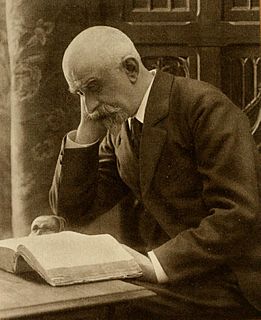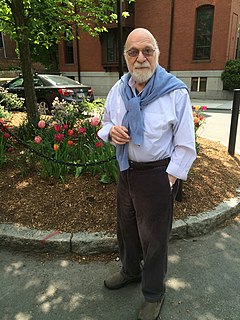A Quote by Henry David Thoreau
I think that there is nothing, not even crime, more opposed to poetry, to philosophy, ay, to life itself than this incessant business.
Related Quotes
The belief that man is an irresolute creature pulled this way and that by two forces of equal strength, alternately winning and losing the battle for his soul; the conviction that human life is nothing more than an uncertain struggle between heaven and hell; the faith in two opposed entities, Satan and Christ - all this was bound to engender those internal discords in which the soul, excited by the incessant fighting, stimulated as it were by the constant promises and threats, ends up by giving in and prostitutes itself to whichever of the two combatants has been more obstinate in its pursuit.
Poetry is related to philosophy as experience is related to empirical science. Experience makes us acquainted with the phenomenon in the particular and by means of examples, science embraces the whole of phenomena by means of general conceptions. So poetry seeks to make us acquainted with the Platonic Ideas through the particular and by means of examples. Philosophy aims at teaching, as a whole and in general, the inner nature of things which expresses itself in these. One sees even here that poetry bears more the character of youth, philosophy that of old age.
At the risk of repetition let me say again that my plea is not for immunity to, but for the most unsparing exposure of, the politician who betrays his trust, of the big business man who makes or spends his fortune in illegitimate or corrupt ways. There should be a resolute effort to hunt every such man out of the position he has disgraced. Expose the crime, and hunt down the criminal; but remember that even in the case of crime, if it is attacked in sensational, lurid, and untruthful fashion, the attack may do more damage to the public mind than the crime itself.
Is it not evident, in these last hundred years (when the Study of Philosophy has been the business of all the Virtuosi in Christendome) that almost a new Nature has been revealed to us? that more errours of the School have been detected, more useful Experiments in Philosophy have been made, more Noble Secrets in Opticks, Medicine, Anatomy, Astronomy, discover'd, than in all those credulous and doting Ages from Aristotle to us? So true it is that nothing spreads more fast than Science, when rightly and generally cultivated.
Philosophy... is indeed outrageous, inherently so. It seeks to disquiet the foundations of our lives and to offer us in recompense nothing better than itself- and this on the basis of no expert knowledge, of nothing closed to the ordinary human being, once... [one] lets himself or herself be informed by the process and ambition of philosophy.
I wonder what it means when Americans say I'm an American. In Britain the culture is basically the same from one end of the country to the other. And when I came here and I saw Americans who live, I don't know, in you know, Northwestern California as opposed to Americans who live in Louisiana, as opposed to Americans who live in the Nevada desert. English even is literally a picture that I have in my mind of an oak tree in the field, a single oak in a green field. And also when I think of my Russian roots, it's the landscape that I connect with as more than maybe the poetry or the drama.
When philosophers talk about reason they often have in mind Having been in the business of philosophy more than half my life, I have learned that reason doesn't change many minds. But there's a more ordinary sense of resonableness, which involves not just logic but a sensitivity to other peoples real concerns, a desire to understand, even when you don't agree. Many people are reasonable in this way.I'm willing to think that the world will be made better by the conversations of reasonable people, even if there are unreasonable people and people who don't want to converse as well.

































